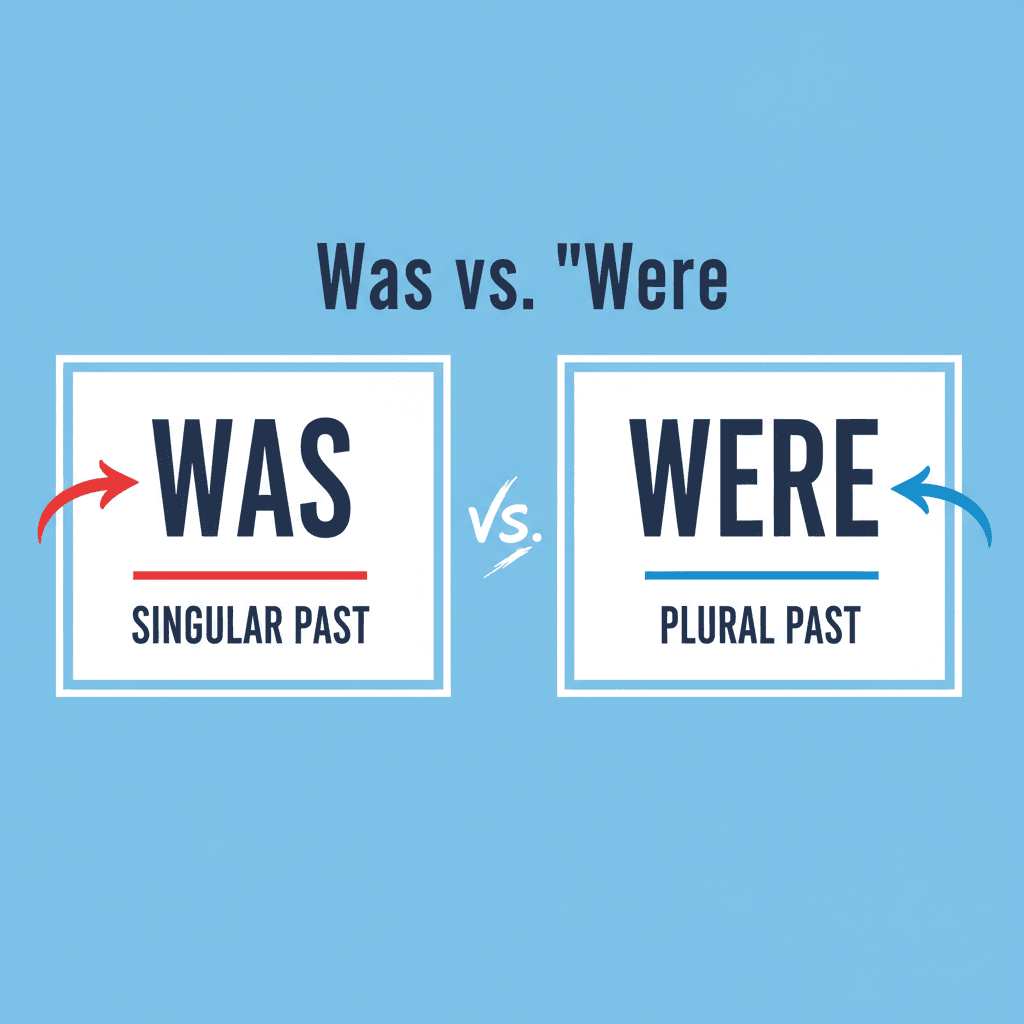Was vs. Were: What’s the Difference?
 Both was and were are past tense forms of the verb to be, but they depend on the subject and the situation — whether it’s real or hypothetical.
Both was and were are past tense forms of the verb to be, but they depend on the subject and the situation — whether it’s real or hypothetical.
Let’s break it down simply.
Was: Singular, Real, and Past
Meaning
“Was” is used with singular subjects (I, he, she, it) when describing real or factual past situations.
Examples (10 total)
- I was tired after work.
- She was at the party last night.
- He was late for school.
- It was raining yesterday.
- The room was cold.
- I was happy to see you.
- There was a problem with the system.
- The cat was sleeping all day.
- That movie was really funny.
- Everything was perfect.
🧠 Tip:
Use was when talking about something that actually happened in the past and involves I, he, she, or it.
Were: Plural or Hypothetical
Meaning
“Were” is used in two main ways:
- With plural subjects (you, we, they).
- In hypothetical or imaginary situations (called the subjunctive mood).
Examples (Plural Use)
- We were at the concert.
- You were early today.
- They were on vacation.
- The dogs were barking loudly.
- You all were amazing!
Examples (Hypothetical Use — Subjunctive Mood)
- If I were you, I’d take the job.
- I wish I were taller.
- If he were here, he’d help us.
- Suppose it were true — what then?
- If it were not for her, we’d be lost.
🧠 Tip:
Use were for “not real” or “imaginary” situations — even if the subject is singular.
Quick Comparison Table
| Subject | Real Situation (Past) | Hypothetical Situation |
|---|---|---|
| I | I was tired. | If I were rich, I’d travel the world. |
| He / She / It | She was late. | If she were here, she’d laugh. |
| You | You were amazing. | If you were smarter, you’d know. |
| We | We were hungry. | If we were faster, we’d win. |
| They | They were upset. | If they were honest, they’d tell us. |
How to Remember the Difference
👉 Was = Fact or reality
👉 Were = Plural or imagination
💡 Memory Trick:
If it’s real, use was.
If it’s imaginary, use were — even for “I” or “he.”
Common Mistakes
❌ If I was you, I’d quit.
✅ If I were you, I’d quit.
❌ He were late yesterday.
✅ He was late yesterday.
❌ They was playing soccer.
✅ They were playing soccer.
Why It’s Confusing
Because English often uses “were” in imaginary cases where you’d expect “was.”
For example, If I were rich sounds strange — but it’s grammatically correct because it describes an unreal situation.
Even AI writing tools confuse this sometimes, which is why Humanizey helps refine grammar and tone automatically — ensuring your text sounds natural and correct.
FAQs
1. Can “was” ever be used for “you”?
No. Always use “were” with “you” — no matter if it’s singular or plural.
2. Is “If I was” ever acceptable?
In informal speech, yes — but “If I were” is grammatically correct in writing.
3. What’s the past tense of “be”?
It depends on the subject:
- I/he/she/it → was
- you/we/they → were
4. What’s the plural of “was”?
There isn’t one — you use “were” for plural subjects.
Practice: Choose the Correct Word (“Was” or “Were”)
(Answers are listed at the end.)
- I ___ at the beach yesterday.
- You ___ amazing in that show!
- If I ___ rich, I’d buy a castle.
- He ___ sick last week.
- They ___ best friends in college.
- She ___ here when the call came.
- We ___ going to tell you earlier.
- If he ___ honest, he’d admit it.
- There ___ no seats left at the concert.
- I wish it ___ sunny today.
Answers
- was
- were
- were
- was
- were
- was
- were
- were
- were
- were
